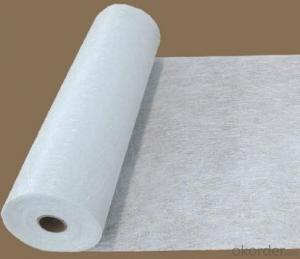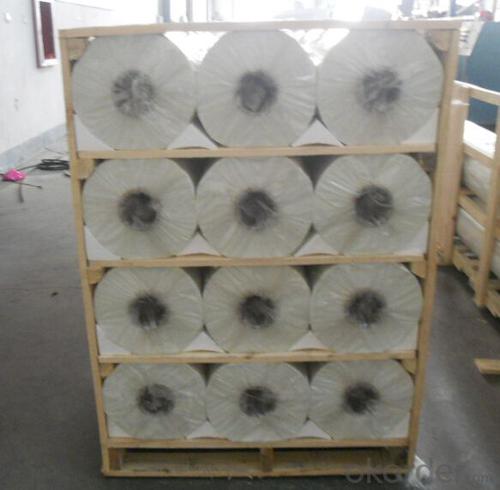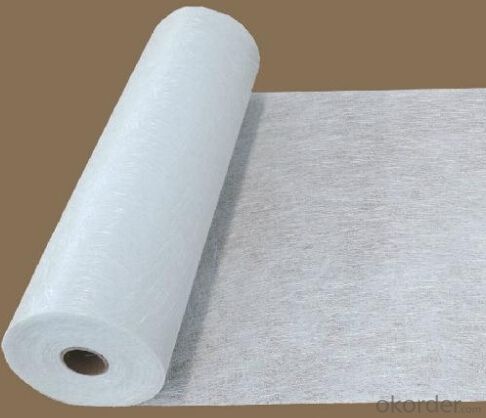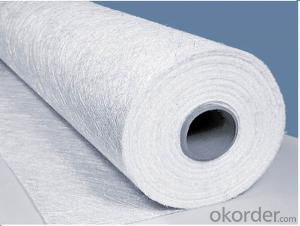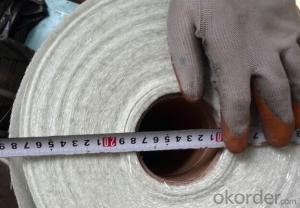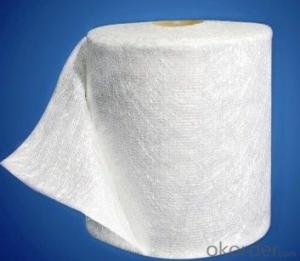Fiberglass Mat Tissue E Glass Fiber Chopped Strand Mat for FRP Panel
- Loading Port:
- Shanghai
- Payment Terms:
- TT OR LC
- Min Order Qty:
- 4000 kg
- Supply Capability:
- 200000 kg/month
OKorder Service Pledge
OKorder Financial Service
You Might Also Like
Introduction of E-glass Chopped Strand Mat
Chopped strand mat is made from fiberglass chopped strands boned with powder binder or emulsion binder.
E glass chopped strand mat is made from fiberglass strands chopped to length and bonded together with powder binder.Chopped strand mat is used primarily for hand lay-up processes, filament winding and press molding of FRP products. Typical products include bathroom accessories, pipe, building materials, automobiles, furniture and other FRP products.
This products ischaracterized bg good combination of resin,easg operation ,good wet strengthretention,good laminate transparency
Chopped strand mat is used primarily for hand lay-up processes, filament winding and press molding of FRP products. Typical products include bathroom
accessories, pipe, building materials, automobiles, furniture and other FRP products.
Features of E-glass Chopped Strand Mat
1.Warp and weft rovings aligned in a parallel,flat manner and uniform tension .
2.Densely alighed fibers,providing high dimensional stability ans easy handing .
3.Good moldability,fast and complete resin wet-out ,enabling high productively .
4.Good transporsision and hign strength of the composite products.
5.Even thickness ,no fuzz ,no stain.
6.Fast wet-out ,products with high strength ,little loss for strength in damp situation.
Features of E-glass Chopped Strand Mat
1.the composit products have high dry and wet tensile strenth and good transparency.
2.Low fuzz ,dirt ,impurity and other stain
Images of E-glass Chopped Strand Mat
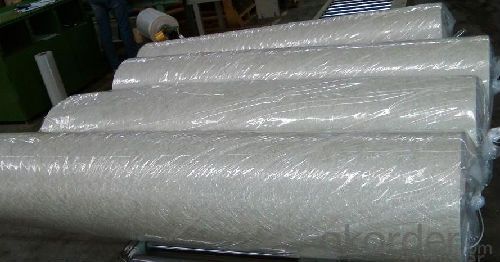
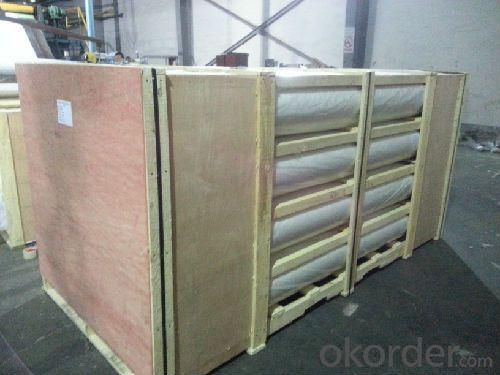
E-Glass Chopped Strand Mat Specification:
Property | Glass type | Weight(g/m2) | Width 200~3300 | Roll Weight | Moisture Content /% | Combustible Content /% | Breakage Strength /N |
Test Method | GB/T 1549 | ISO3374:2000 | ISO3374 | GB/T17470-1998 | ISO3344:1997 | ISO1887:1995 | ISO3342 |
EMC 80 | E-GLASS | 80±16 | ±5 | 6~50 | <0.2 | 13.6±0.35 | ≥200 |
EMC 100 | E-GLASS | 100±10 | ±5 | 6~65 | <0.2 | 9.5±0.35 | ≥170 |
EMC 150 | E-GLASS | 150±15 | ±5 | 6~97 | <0.2 | 8.0±0.35 | ≥40 |
EMC 225 | E-GLASS | 225±22 | ±5 | 6~150 | <0.2 | 5.0±0.6 | ≥60 |
EMC 300 | E-GLASS | 300±30 | ±5 | 6~180 | <0.2 | 4.0±0.6 | ≥90 |
EMC 450 | E-GLASS | 450±45 | ±5 | 6~180 | <0.2 | 3.8±0.6 | ≥120 |
EMC 600 | E-GLASS | 600±60 | ±5 | 6~240 | <0.2 | 3.6±0.6 | ≥150 |
EMC 900 | E-GLASS | 900±90 | ±5 | 6~190 | <0.2 | 3.4±0.6 | ≥180 |
FAQ of Chopped strand mat
1. Why Choose us?
CNBM is a stated own company, provide the guarantee for the best quality, best service and safety business.
2. How will we guarantee the quality?
a, ISO 9001-2008 quality control system;
b, Strict and regular quality control in production;
c, Inspeciation when loading into container before shippment;
d, Sample stock for one year for quality tracing and record.
3. What is your MOQ?
Our MOQ is one pallet.
4. Can you provide sample?
Yes, samples are in stock. we can offer free sample for you.
5. Payment terms?
We can accept L/C, T/T etc.
6. Do you offer OEM service?
Yes, we can print customers’ logo on the packaging;
And the size and specification can be produced and design according to your demand.
- Q: What is the UV resistance of fiberglass mat tissue?
- The UV resistance of fiberglass mat tissue may vary depending on the specific formulation and manufacturing process employed. Generally, fiberglass mat tissue is renowned for its outstanding ability to withstand ultraviolet (UV) radiation. The mat's fiberglass strands typically receive a coating of resin or binder, which affords additional safeguard against UV degradation. This coating acts as a barrier, preventing the fibers from deteriorating or becoming brittle under sunlight exposure. Moreover, the dense and tightly woven construction of the fiberglass mat tissue itself grants a certain level of inherent UV resistance. Nonetheless, it is crucial to note that extensive exposure to intense UV radiation can still result in some degree of deterioration over time. As such, it is advisable to refer to the specific product specifications or manufacturer's guidelines for precise information regarding the UV resistance of a particular fiberglass mat tissue.
- Q: What are the factors that affect the diameter of electrospun nanofibers?
- Twist, twist, break, watch your strength, wave shape
- Q: Does fiberglass mat tissue require any special precautions during storage?
- Yes, fiberglass mat tissue does require some special precautions during storage. Fiberglass is a delicate material and can be easily damaged if not stored properly. Here are some precautions to consider: 1. Keep it dry: Fiberglass mat tissue should be stored in a dry and moisture-free environment. Moisture can cause the material to lose its strength and integrity. 2. Avoid direct sunlight: UV rays from sunlight can degrade fiberglass over time. Store the material in a cool, shaded area away from direct sunlight to prevent any damage. 3. Protect from dust and dirt: Fiberglass mat tissue should be stored in a clean and dust-free environment. Dust and dirt particles can get embedded in the material, making it less effective. 4. Avoid extreme temperatures: Extreme heat or cold can also affect the quality of fiberglass mat tissue. It is best to store it in a temperature-controlled environment to prevent any damage. 5. Use proper packaging: If the fiberglass mat tissue comes with packaging, it is recommended to keep it in its original packaging to provide an additional layer of protection. If not, consider using a durable and moisture-resistant wrapping material. By following these precautions, you can ensure that your fiberglass mat tissue remains in good condition during storage and is ready for use when needed.
- Q: What is the expected lifespan of fiberglass mat tissue in residential applications?
- The expected lifespan of fiberglass mat tissue in residential applications can vary depending on various factors such as the quality of the material, installation techniques, climate conditions, and maintenance. However, on average, fiberglass mat tissue can last for 20 to 30 years in residential applications when properly installed and maintained.
- Q: Is fiberglass mat tissue suitable for insulation in educational facilities?
- Yes, fiberglass mat tissue is suitable for insulation in educational facilities. Fiberglass mat tissue is commonly used in insulation applications due to its excellent thermal insulation properties. It is a lightweight and cost-effective material that can effectively insulate buildings, including educational facilities, against heat loss or gain. Fiberglass mat tissue is also known for its fire-resistant properties, which is an important aspect to consider in any building, especially in educational facilities where the safety of students and staff is a top priority. Additionally, fiberglass mat tissue is easy to install and does not require extensive maintenance, making it a convenient choice for insulation in educational facilities.
- Q: What is the thermal resistance of fiberglass mat tissue?
- The thermal resistance of fiberglass mat tissue typically ranges from 0.3 to 0.6 square meters Kelvin per watt (m²K/W), depending on the specific composition and thickness of the material.
- Q: What are the different finishing options available for fiberglass mat tissue?
- There are several different finishing options available for fiberglass mat tissue. One common finishing option is a resin coating. This involves applying a layer of resin to the surface of the fiberglass mat tissue. The resin helps to protect the fibers and provide added strength and durability. It can also improve the appearance of the material, giving it a smooth and glossy finish. Another finishing option is a fire-retardant treatment. This involves applying a special chemical treatment to the fiberglass mat tissue that helps to reduce its flammability. This is especially important in applications where fire safety is a concern, such as in the construction industry. Additionally, fiberglass mat tissue can be finished with a colored pigment. This involves adding a dye or pigment to the material during the manufacturing process. This allows for a wide range of color options, making the fiberglass mat tissue more visually appealing and versatile. Some manufacturers also offer a textured finish for fiberglass mat tissue. This involves adding a pattern or texture to the surface of the material, creating a more tactile and aesthetically pleasing product. This can be particularly useful in applications where grip or slip resistance is required. Lastly, fiberglass mat tissue can be finished with a laminated backing. This involves bonding the fiberglass mat tissue to a separate backing material, such as foam or fabric. This provides additional strength and flexibility to the material, making it suitable for a wider range of applications. Overall, the different finishing options available for fiberglass mat tissue allow for customization and adaptation to specific needs and requirements. Whether it's adding strength, fire resistance, color, texture, or additional backing, these finishing options enhance the performance and appearance of fiberglass mat tissue in various industries.
- Q: Can fiberglass mat tissue be recycled?
- Yes, fiberglass mat tissue can be recycled. Fiberglass is made from a combination of glass fibers and resin, and both components can be reused. The recycling process involves separating the glass fibers from the resin, often through a mechanical grinding or melting process. The separated fibers can then be used to make new fiberglass products, such as insulation, roofing materials, or even new fiberglass mat tissue. Recycling fiberglass helps to reduce the environmental impact of this material by diverting it from landfills and conserving resources. However, it is worth noting that the recycling process can be complex and costly, so not all recycling facilities may accept fiberglass mat tissue.
- Q: Can fiberglass mat tissue be used for making lightweight doors?
- Yes, fiberglass mat tissue can be used for making lightweight doors. It is a lightweight material that offers excellent strength and durability, making it suitable for door construction. Additionally, fiberglass mat tissue can provide insulation properties and resistance to moisture, making it a viable option for lightweight door manufacturing.
- Q: Can fiberglass mat tissue be painted over?
- Yes, fiberglass mat tissue can be painted over. However, there are a few considerations that need to be taken into account. First, it is important to ensure that the fiberglass mat tissue is clean and free from any dirt, grease, or other contaminants before painting. This can be achieved by cleaning the surface with a mild detergent and water, followed by thorough rinsing and drying. Secondly, it is recommended to apply a primer before painting to improve adhesion and promote a smoother finish. A high-quality primer specifically designed for use on fiberglass surfaces should be used, following the manufacturer's instructions for application. Finally, when choosing the paint, it is crucial to select one that is compatible with fiberglass materials. Acrylic or epoxy-based paints are often recommended as they provide good adhesion and durability on fiberglass surfaces. By following these steps and using appropriate materials, it is possible to paint over fiberglass mat tissue successfully. However, it is always advisable to consult with a professional or follow the manufacturer's recommendations for optimal results.
Send your message to us
Fiberglass Mat Tissue E Glass Fiber Chopped Strand Mat for FRP Panel
- Loading Port:
- Shanghai
- Payment Terms:
- TT OR LC
- Min Order Qty:
- 4000 kg
- Supply Capability:
- 200000 kg/month
OKorder Service Pledge
OKorder Financial Service
Similar products
Hot products
Hot Searches
Related keywords


